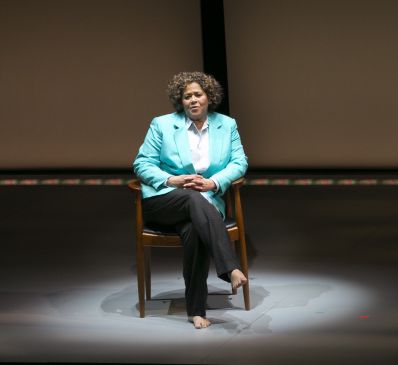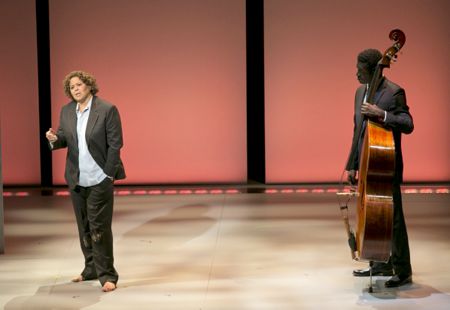Performance, Play (2016)
Created, Written and Performed by Anna Deavere Smith
Directed by Leonard Foglia
American Repertory Theater
Loeb Theater, Harvard University
Harvard Square, Cambridge, MA
August 20 – September 17, 2016
Music Composed and Performed by Marcus Shelby
Set Design: Riccardo Hernandez; Costume Design: Ann Hould-Ward; Lighting Design: Howell Binkley; Sound Design: Dan Moses Schreier; Projection Design: Elaine McCarthy; Dialect Coach: Amy Stoller; Movement Coach: Michael Leon Thomas; Dramaturg: Alisa Solomon; Production Stage Manager: Taylor Brennan

in “Notes from the Field: Doing Time in Education”
Photo: Evgenia Eliseeva
Courtesy of American Repertory Theater
Twenty-four years ago Anna Deavere Smith made a splash at the American Repertory Theater with Fires In The Mirror: Crown Heights, Brooklyn and Other Identities, her one woman performance about the conflict between Hasidic Jews and African-Americans in the Crown Heights section of Brooklyn. Smith had turned sections of taped interviews she had done with various members of those two communities into monologue texts which she then performed with artfully conceived sequencing. The result was a fascinating and empathic look into that heartbreaking conflict.
With a laudable set of theatrical, film and television credits to her name in the interim, Smith has done it again with this new, bold, innovative production based on a series of interviews done around the general themes of education, racism and the so-called school-to-prison pipeline which leads from getting into trouble in school to a life of incarceration. With elements taken from administrators, students, demonstrators, teachers, and a host of other personalities who weigh in on these issues, Smith creates an eminently persuasive environment of reflections on the complex issues involved.
The show takes place in three parts: Radical Welcome, a long introductory act which represents the meat of the performance and which fills the first ninety minutes, followed by a half-hour during which the audience disbands and forms into small discussion groups to take up the issues interactively, and a final Coda in which Smith once again delivers a compelling theatrical conclusion.

in “Notes from the Field: Doing Time in Education”
Photo: Evgenia Eliseeva
Courtesy of American Repertory Theater
Smith is not only an astute interviewer and compiler of interview segments but is a consummate performer. She has, remarkably, the capacity to channel each of these persons in a way that is at once revealing, intimate, humorous and sympathetic. Smith brings to her interpretations a kind of compassionate satire that at once draws in her listeners by providing a vividly felt identification with her subjects, while also amusing her listeners by offering subtly histrionic hyperbole that seasons but never undermines the underlying empathy. It’s a remarkable combination of traits that leads to a result that is at once forceful, direct, vividly moving and remarkably entertaining.
The build-up during the first part of the evening involves scads of interesting and moving embodiments by Smith, ranging from administrators like Sherriyn Ifill, President of the NAACP Legal Defense and Educational Fund, talking in relative official-ese about global budgets and the nature of the problem writ large, to high school principals like Linda Wayman who passionately but earnestly express the modest desire to save even just a single student from the always hovering destinies of crime and jail.
The account of Allen Bullock, who was jailed in February 2016 for protesting the death of police victim Freddie Gray in Baltimore by smashing a traffic cone through a car windshield, is movingly desperate.
The story of Shakara, torn out of her seat in a high school classroom, and that of classmate Niya who witnessed it, is breathtakingly delivered and deeply disturbing.
In the coda, Smith brings to life James Baldwin, with all of his simmering rage and earnest effeteness vividly present, a kind of tribute and poke in the ribs at the same time.
As well, she invokes Bree Newsome, the artist and activist who shimmied up to the top of the state house in South Carolina in June 2015 to take down the Confederate flag.
And the very final scene, Smith literally embodies John Lewis, giving a jarringly moving account of Lewis’ encounter with Montgomery, Alabama police leaders of the current day and of fifty years ago. It’s a stirring portrayal and Smith renders it in a way that frames the dire depictions and assessments that precede it with a distinct aura of hope. It’s an amazing moment.
Smith performs with Marcus Shelby, who plays a great improvisational bass and provides Smith a gently interactive sidekick on stage when she needs one.
Video and projected stills as designed by Elaine McCarthy are used intelligently on a series of panels as part of a sleekly intelligent set designed by Riccardo Hernandez which rise and fall around Smith as she moves across the stage.
The idea of including a discussion in the middle of the show is interesting and daringly innovative. The one in which I took part took a while to get going but ultimately raised some important ideas about systematic racism and education leading to some interesting interchanges.
This is a tour de force performance. Smith carries the show basically singlehandedly for a very long stretch and does it vividly and compellingly, nurturing and conveying her extensive and varied monologues with enormous self-possession and expressiveness. Not to be missed, Smith’s performance and its conveyance of urgently significant issues in a penetrating and inventive way represents socially and politically oriented theater at its most distinctive.
– BADMan
Spot on Charlie! Loved your review!